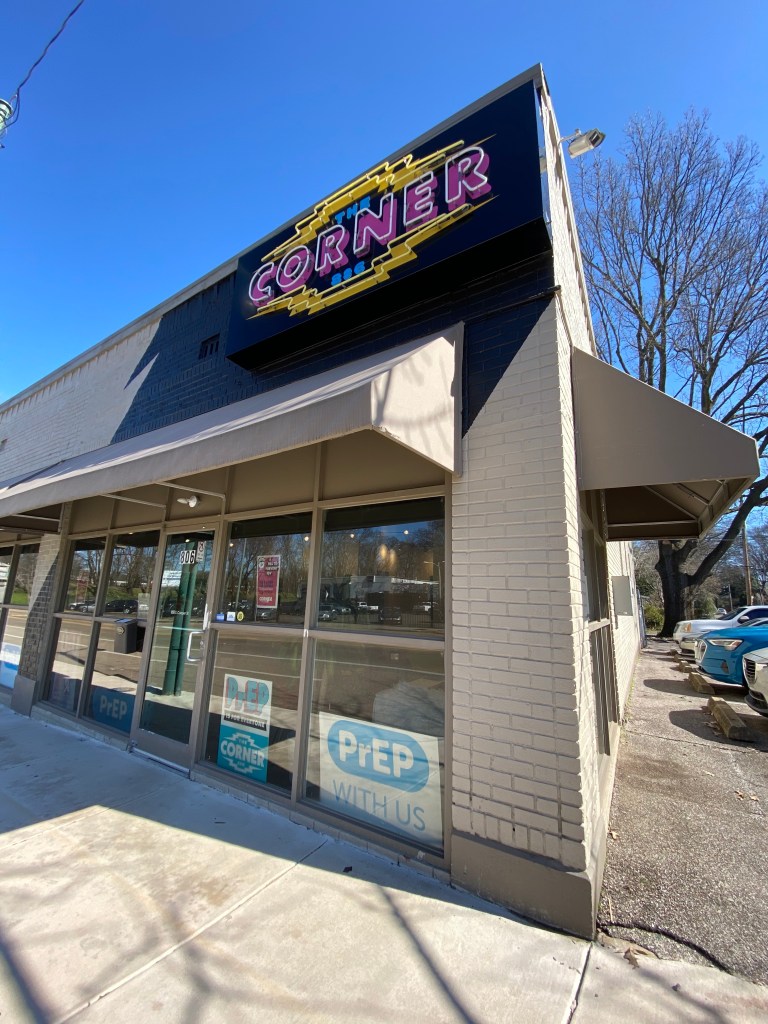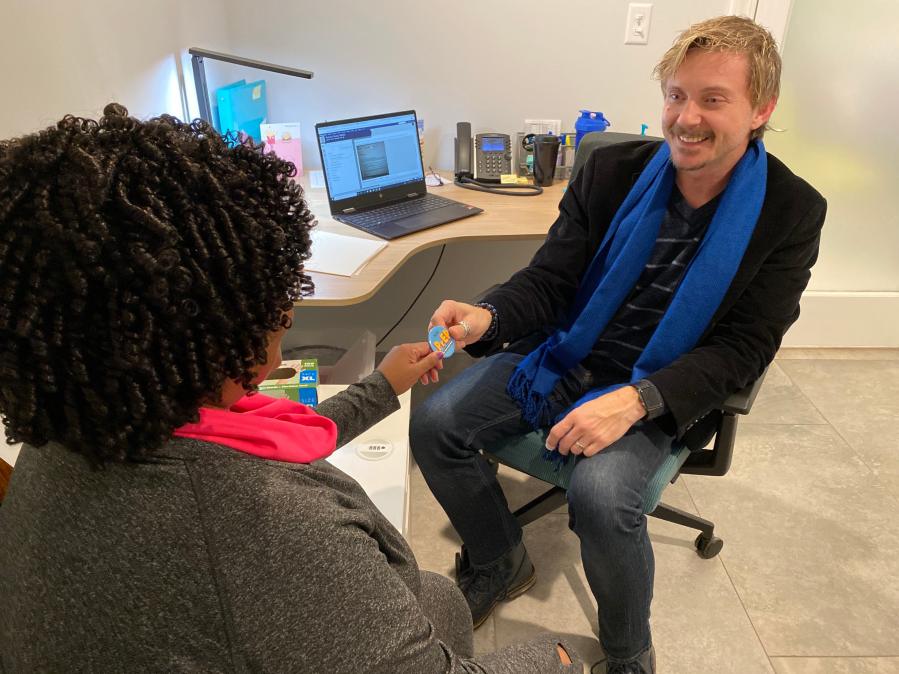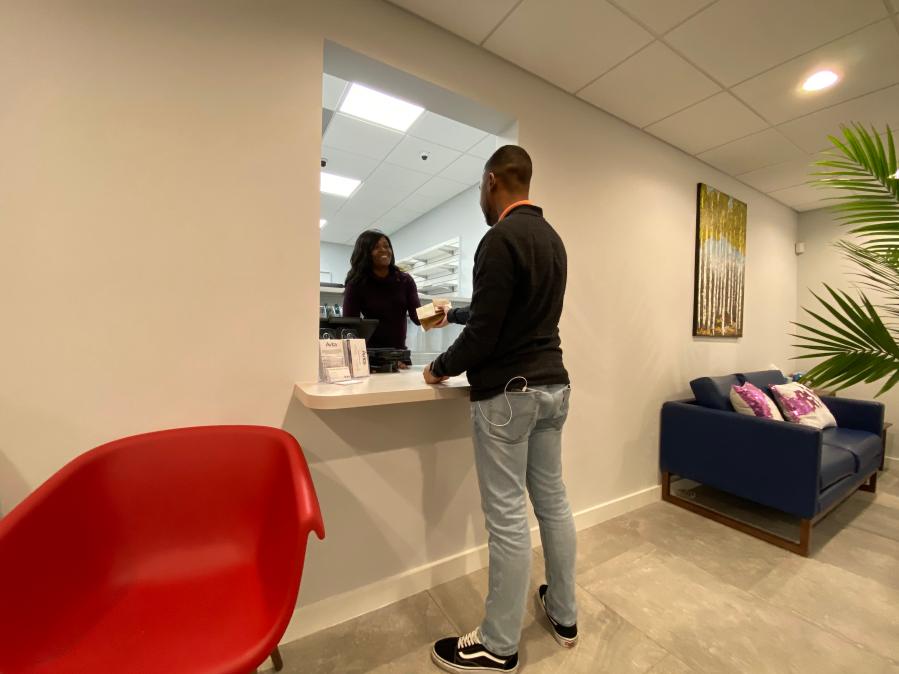MEMPHIS, Tenn. — A new center in Cooper-Young is making strides to fight the growing HIV and STI infection rates in the Mid-South by providing sexual health services for free.
The Corner opened at 806 S. Cooper St. in October 2019.

The center was opened by Friends for Life, a local nonprofit dedicated to preventing the spread of HIV and helping those affected by HIV/AIDs live well.
“We’re eighth in the nation on new HIV infections,” Director of Prevention Eric Leue said. “So, we have so many new infections here in this county, that we really needed something different.”
Testing only takes 30 minutes and people can walk into the center without an appointment or they can call and schedule.
“Here in Shelby County, we have a really high under-insured and uninsured rate. We have a really high rate of folks living under the federal poverty line,” Leue said. “So, again, that was just the focus and the emphasis on whatever we’re doing. We’re going to do it in a way that is accessible to everybody.”
Leue oversees The Corner’s day-to-day operation. He has been working with HIV-related issues and public health for more than 15 years. Since 2013, he’s put more than 1,000 people on Pre-Exposure Prophylaxis.
His experience dealing with with HIV and public health is why Friends for Life Executive Director Diane Duke reached out to him about this project.

“I knew of Eric from my time in Los Angeles,” Duke said. “He was a fierce advocate for HIV, PrEP and PEP. He had spoken nationally and internationally about PrEP and PEP and is extremely well-connected and knowledgeable on the subject.”
Duke, who took over as the executive director of Friends for Life four years ago, said her goal with ‘The Corner’ was to ensure PrEP and PEP treatments were easily available for people who are sexually active.
“I have wanted to provide access to PrEP and PEP from the time I moved here four years ago. Prior to expanding services, it was important to create an infrastructure to support that expansion,” Duke said.
Duke says the expansion also was meant to create a robust finance department with a solid fiscal plan and technological advancements. However, she says the key to the success of both The Corner and Friends for Life is the outstanding board of directors and the staff that works with the organization on a daily basis.
WHAT IS PrEP and PEP?
There are multiple medications and drugs being used to fight HIV infections to date. However, two popular methods being used as preventatives are PrEP and PEP.
PrEP, which can be one of two drugs: Truvada or Descovy, is a pill taken once a day to prevent HIV infection.
According to the U.S. Food and Drug Administration, Descovy was approved to be used as a PrEP medication in October while Truvada was first approved in 2012.
“You take one pill a day in advance. Should you ever be exposed to HIV, the virus is basically not able to infect you because you have the medication in your body,” Leue said. “PEP, in contrast to it, is basically the morning after pill. If something happens, you’re not quite 100% sure. We’ve able to provide you that.”
If an individual has to take PEP due to a potential HIV exposure, they need to start treatment within 72 hours of the exposure. It is not to be used as a pregnancy preventative, Leue said.
According to Leue, PEP has an 80% chance of preventing HIV infection. PrEP, on the other hand, is 99.9% effective in preventing HIV.
“We can’t say it’s 100% because nothing is ever 100% but 99.9% is incredibly good,” Leue said.
Fighting the growing STI infection rate
The Corner offers more services to clients other than HIV prevention. The staff is also equipped to help clients with issues involving STI infections.
A recent report from the U.S. Centers for Disease Control and Prevention showed cases of gonorrhea, chlamydia and syphilis have risen for the fifth year in a row.
Leue says those numbers are relevant to Shelby County.
According to the Tennessee Department of Health, there was a new case of HIV for every 690 people per 100,000 people in 2017. At the time, there were a little more than 6,000 people living with the virus.
“We have 10 times the national average in gonorrhea rates, 10 times the national average on chlamydia and three-and-a-half times the national average on syphilis,” Leue said.
Those three STI infections are bacterial, which Leue said means they are easy to contract and pass on.
“So, we do all of that testing here for free as well. Should any of our clients return with an active result, we get them into treatment for free as well.”
Aside from HIV, clients can be screened for syphilis, gonorrhea, chlamydia and hepatitis B and C.
Due to the high rates of STI infections in the area, Leue says testing should be a common thing among people.
“Everyone should get tested once a year,” Leue said. “Here at The Corner, we do it once every three months. It’s a very standard rhythm also for PrEP and PEP users.”
The Corner is not a clinic
“We went to great strides to make this not a medical space,” Leue said. “As you look around, it feels a lot more lounge-y, it feels a lot more chill.”
Although it offers the resources and medical procedures as a traditional clinic, the staff is not required to wear uniforms and Leue said they take a very easy approach with their clients to focus on their needs.
“The Corner was created around customer service with the unique idea that everyone deserves top quality healthcare regardless of their ability to pay,” Duke said. “Creating an environment that is warm and welcoming was a natural part of the concept.”
The center works also with local artists to hang art in a part of the lobby to help create the warm feeling that Duke said she envisioned for the center.
“The art gallery section of The Corner helps to create a beautiful space while simultaneously supporting local LGBTQ friendly artists,” Duke explained.
Leue said the staff is also able to sell the art with all of the money going directly back to the artists.
The center operates as a nonprofit.
“We pieced together a number of funding sources to create The Corner, including state and federal funds as well as foundation grants and major donor support,” Duke said.

She said funding was one of the biggest challenges to get the project off the ground.
“Dr. Shawn Hayden is our volunteer Medical Director and a big part of making the The Corner possible,” Duke said.
Hayden is a local doctor who practices medicine through the Methodist Le Bonheur healthcare system.
Leue said another major difference is the center offers prevention services with a pharmacy on site.
Sexual Health and Stigma
As the fight against sexual health stigma continues to change, Duke says the stigma behind sexual health is still a major hurdle.
The CDC uses the term “sexually transmitted diseases” when referencing STDs. More recently, the phrase “sexually transmitted infections” became acceptable and more used.
According to the American Sexual Health Association, there are approximately 20 million new STI cases a year. Half of those cases occur among people 15 to 24 years old.
The ASHA says the new use of “infection” opposed to “disease” is due to accuracy and to fight stigma. Disease suggests a medical problem associated with clear signs and symptoms. Several of the most common sexually transmitted viruses have little to no signs or symptoms, it is more accurate to refer to them as infections rather than diseases.
“There is a great deal of stigma related to HIV, PrEP, PEP as well as LGBTQ issues,” Duke said. “Stigma keeps people from being tested, from getting treatment and from being proactive about their sexual health.”
Stigma is one of the main issues among people living in the Mid-South.
Receptionist and Medical Records Specialist Jacquine Rankins at The Corner has been involved with Friends for Life off and on for five years.
“My passion was mostly the African-American community with the disparities. They don’t get a chance to feel comfortable with taking care of themselves and I wanted to change that,” Rankins said.
She said the stigma is strong within the African-American community because of living in the Bible Belt and because of disparities people of color tend to experience.
As of 2017, the state department of health reported more than 5,000 African-Americans were living with HIV. The department of health says the rate of people being diagnosed was 1,0809.62 people per 100,000.
“So, the African-American community is like 80 to 20…,” Rankins said. “Here in Shelby County, there is 6,000 (cases) alone and 80 percent of those are African-American.”
She said that the stigma within the community is based on the disparities such as access to health care, funding and their families.
“If they’re kicked out because of their lifestyle and what they choose to do, it’s not easy for them to have that friend to say ‘come on in and let me help you. So they won’t say anything about it,” Rankins said.
“HIV does not discriminate. HIV is not what it was first thought: ‘Oh, that’s a gay thing.'” Leue said. He says the virus and none of the STIs discriminate on gender or sexual orientation.
The Corner is open Mondays, Tuesdays, Saturdays and Sundays from noon to 8 p.m. On Wednesdays through Fridays, it is open 8 a.m to 3 p.m.
Aside from The Corner, people can also get tested for HIV at the Friends for Life headquarters at 43 North Cleveland and downtown at 206 G.E. Patterson, which is known as The Haven.

















